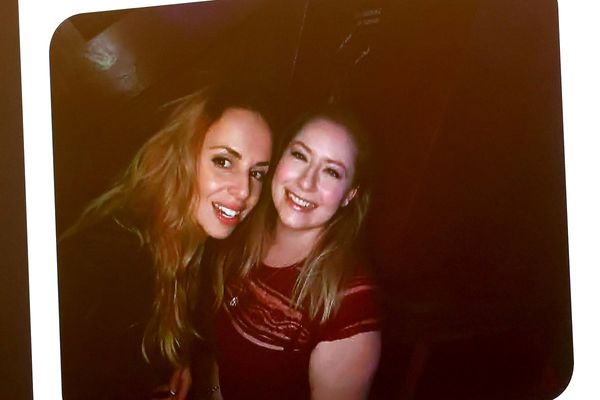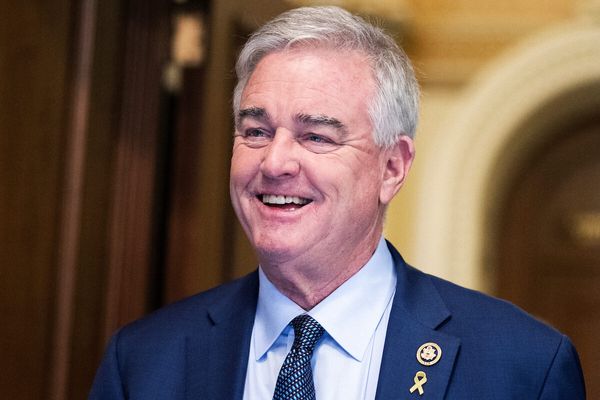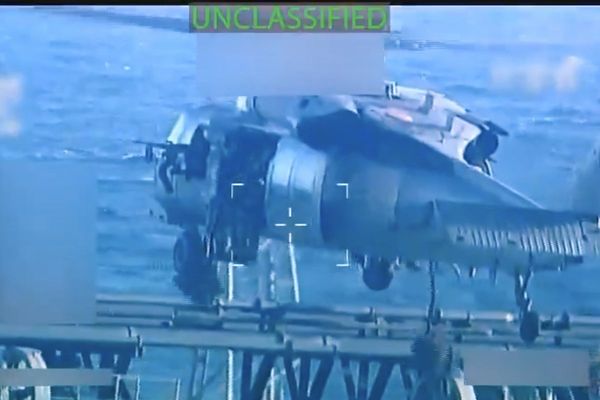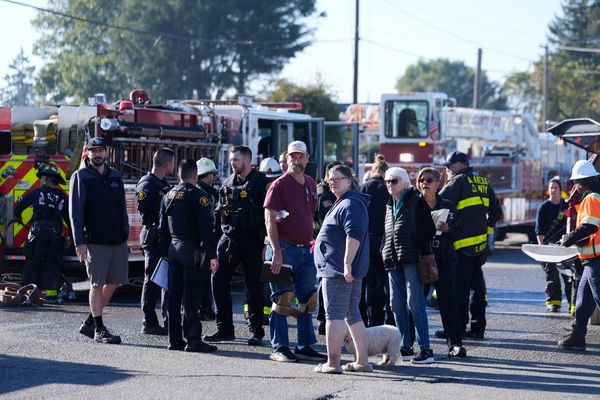
“New reality TV show seeks contestants. One year, £100,000,” read a small advert in the Stage in 2002, instructing the public to apply “if you’re characterful, resourceful and energetic”. Hundreds did. An audition with production teams and camera crews was held at Raven’s Ait island in the Thames in Surbiton, west London, with potential contestants delivered via boat, and a young man known as Nik Russian at the centre of it all.
“It was so professional,” recalls Lucie Miller, who was 34 at the time. “Everybody oozed confidence and Nik was extremely charismatic.” Daniel Pope, then 25, recalls Russian being “a very handsome man who looked as if he belonged in Hollywood”.
Russian whittled it down to 30 people who then prepared to say goodbye to their lives for an entire year. Notices were handed in, relationships ended, homes and possessions sold – only for the promise of cash, fame and success to come crashing down.
A new three-part documentary, The Greatest Show Never Made, tells this wild story. Merging fresh interviews with contestants, original 2002 footage, and colourful and goofy re-enactments, it transports viewers back to the early 2000s reality TV boom, when a sixth of the UK’s population was watching Big Brother and a spate of copycat series would emerge in its wake.

Such shows offered a chance of escape, adventure, and to potentially change the course of ordinary people’s lives. Jane Marshall was 21 and living with her parents near Manchester. She “felt like something was missing from my life” and hoped the show could boost her profile as an aspiring actor.
Tim Eagle was 37 and “feeling stuck” while working as a clown. “I was time rich but money poor,” he says. “I had a nice life, a solid social housing flat,” he says, “but couldn’t see how I could make the next step. This felt like it could get me on the housing ladder.” Miller, meanwhile, was working in the carpet industry in Birmingham but “needed something that would give me a buzz”. She was supporting her parents financially and saw the prize money as a means “to eradicate their worry and mine”. Pope had moved from the Caribbean to London two years earlier and simply wanted an adventure. “I jumped headfirst into any opportunity I saw,” he says.
Contestants packed for all eventualities, thinking they might be sent to a jungle, only to be directed to London. There, they were split into three teams of 10. Team two, which Pope, Marshall, Miller and Eagle were part of, found themselves in New Cross, south-east London, “in this dank, damp park where everyone was standing in the rain”, recalls Pope. All the professionalism, and crew, of those first auditions had vanished.
Russian, with his leather jacket and Hugh Grant hair, hovered in the background making phone calls while groups of perplexed people stood around. Each team had been given their challenge: to make £1m in a year. It became clear there was no prize money. They had to make their own, as well as find food and shelter. Oh, and the show didn’t exist. There was no commission from a broadcaster, as they had been told. Russian’s idea was to make it and, he hoped, sell it.

Seven members of team two relocated to Eagle’s nearby flat to take stock. Tim had been given the role of cameraman on the show and so was filming everything, using his own equipment. “I was on a mission,” he says. “It was changing in front of me but I could still hold on to it. Then it just evolved quickly and became another story.”
By this point, teams one and three had smelled a rat and baled out – Russian was not, in fact, head of the prestigious Nik Russian Productions but was working in Waterstones. Still, team two pressed ahead. “People were saying: maybe it’s a test,” says Miller, “and we’ve got to prove our worth?” Day turned into night and soon Tim had a flat full of people sleeping on floors, sofas and chairs, clinging on to the hope that this show might still happen. “I was ready to stay no matter what,” says Marshall. “I thought: let’s see what we can do.” Eagle set up a diary room and the group began making their own reality TV show. The footage is evocative of the time: bottles of WKD Blue, retro England kits, bootcut jeans and the bright purple living room walls of Eagle’s flat – which in The Greatest Show Never Made has been reconstructed as a set where contestants are interviewed. “An extraordinarily surreal experience,” says Eagle. “Like The Truman Show.”
Some people had too much riding on the show to give up. “My dad had high expectations and was always disappointed in me,” says Marshall. “He had told me not to go, so the hardest thing would have been to go back home and see his face saying: ‘I told you so.’ I couldn’t stand that disappointment.” Miller had quit her job and left behind a long-term boyfriend. Only Pope, a student between degrees, had made no large sacrifices.
Matters became really bizarre when Russian turned up at Eagle’s flat and announced that he, too, was broke and homeless, asking if he could stay with them. One contestant threatened to kill him. “I said no fisticuffs,” recalls Eagle. “The atmosphere was really tense.”
The group’s focus changed. “Nik had scammed and deceived us, so all our energy went into: how can we get our own back?” recalls Marshall.
“We all had something in common,” adds Pope. “We hated Nik.”
Eagle stuck the camera on Russian as he sat with his head hung low, chain-smoking cigarettes, looking bruised. The group conspired to invite ITV’s London Tonight to ambush their reality show swindler at the flat. “We stuck him in the corner and grilled him until this proper crew came,” recalls Eagle. “I love the multilayer madness of that – we managed to hoist him by his own petard and hang him out to dry on the medium he so wished to be a part of.”
The report ran on ITV on a Thursday night, three days after the group came to the flat, by which point Russian had fled. A day later, the group met a producer to discuss selling the footage to make an actual show. The answer was no. “He was like: ‘On your way, it doesn’t work like that,’” Eagle recalls.
The adrenaline surge that had kept them going had now subsided as reality crept in. “I asked my girlfriend to come back and she said no,” recalls Eagle. “We split up and that knocked me for six. It was deeply embarrassing; a lot of us had had send-off parties – I’d been thrown this huge surprise party. It floored me. I never picked my camera up again and I just went back to being a clown.”
They were mocked by Harry Hill on TV Burp, while the London Tonight segment referred to them as “the wannabe class”. “I had to overcome humiliation,” says Miller. “I felt embarrassed to go home so soon with everything I had banking on it. Everything felt flat.” For Marshall, the idea of returning to a disappointed father was simply too much and she stayed with other group members in London for months on end, finding a job there.
At this point, the documentary team had not heard from Russian and so hired a private investigator to track him down. “We’ve never learned the why behind all this,” says Pope. “But I think he’s a damaged man. I pity him.”
“He was an egotist; cultish,” adds Eagle. “It was all about him. He was going to be the frontman and take all our money.”
However, despite the clear resentments contestants may have once felt, their reunion has resulted in a softened perspective to their experience. “It’s taken a painful memory and allowed me to completely reappraise it,” says Eagle, who has written a book based on his experiences. Miller, now happily settled with a family, concludes that “life experiences are a gift no matter what and I now really appreciate that”. Pope works in finance, is “very content” and hopes his own daughter will also undertake “weird experiences” and “live life to the fullest”.
As for Marshall, who eventually returned home to a supportive hug from her father, the experience gave her the confidence to pursue her dreams, gaining more acting work in the ensuing years. “If I hadn’t done it I’m not sure I would be the person I am now,” she says. “No matter what life has thrown at me since, you just pick yourself up and carry on.”
• This article was amended on 3 October 2023. A reference to the potential contestants as “the wannabe class” was broadcast on ITV London Tonight, not the documentary The Great Reality TV Swindle, as an earlier version said.
The Greatest Show Never Made is on Prime Video from 11 October.







